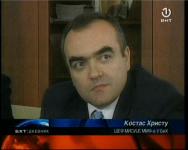 Bosnia’s top western envoy has urged Bosnia’s Bosniak (Bosnian Muslim)-Croat dominated Federation to curb public spending in a bid to get urgent financial support from the International Monetary Fund, IMF.
Bosnia’s top western envoy has urged Bosnia’s Bosniak (Bosnian Muslim)-Croat dominated Federation to curb public spending in a bid to get urgent financial support from the International Monetary Fund, IMF.
“The Federation of Bosnia and Herzegovina must bring its expenditures under control to ensure financial stability and meet IMF requirements. Reducing expenses will not be easy but it must be done, because doing nothing could have very dangerous consequences,” local media on Wednesday quoted Bosnia’s High Representative Valentin Inzko.
Inzko’s appeal was made during his meeting with top Federal officials on the previous day. Meanwhile the IMF mission has started negotiations on a new standby arrangement for Bosnia.
The IMF delegation, led by the head of the organisation’s mission to Bosnia Costas Christou, arrived in the country earlier this week, after Bosnia officially requested from the IMF a loan to the amount of €1 billion to support its dwindling budget.
On Tuesday, the IMF team started technical negotiations with the leaders of the Serb-dominated Bosnian entity of Republika Srpska in the northwestern town of Banja Luka. Once those talks are finalised they will move to the Bosnian capital Sarajevo, where it will continue negotiations with federal and state officials.
Current negotiations could last up to two weeks and if successful, the standby loan could be provided within the next couple of months, officials said.
Christou told media that in line with Bosnia’s current quota with the IMF, the country could at this stage get some €200 million. This amount could be further increased depending on the need and the sort of arrangement it gets.
Yet some Bosnian officials and experts warned that the country was not only ill-prepared for the arduous negotiations with the IMF, but also had little chance of fulfilling the IMF’s tough requirements.
“The frog saw a horse getting calked so it too raised a leg. Equally, Bosnia and Herzegovina saw Croatia and Serbia asking for IMF help, so it too came to believe that it will get a standby arrangement without (prepared) development projects and radical spending cuts,” Bosnia’s deputy Minister of Finance and Treasury Fuad Kasumovic told media.
Kasumovic reprimanded both state and entity governments for calling on the IMF without having any prepared platforms for negotiations. He said that even worse was the fact that the governments knew neither how much money they really need nor how to spend it.
Kasumovic stressed that IMF will not allow its funds to be used to cover excessive administration salaries and social benefits, which deepen the budget deficit on a daily basis and have to be reduced by 30-40 percent.
He added that IMF will also not give its loan for development projects, when Bosnia already has loans approved from the EU and international financial and development organisations to an amount close to €1 billion. But because of its dysfunctional administration and quarrelling politicians, Bosnia is unable to withdraw those funds and has to pay thousands of euros of penalties each month for unused resources.
In light of those facts, Kasumovic said he was “pessimistic” regarding prospects for Bosnia to secure an IMF loan.
Other experts and media also expressed similar doubts.
The biggest problem was with the Bosniak-Croat Federation, which in addition to high salaries has spent excessively on influential war veterans and invalids, while discriminating against other social groups. Local analysts say that an attempt to curb spending on war veterans and invalids may bring down the already shaky federal government and trigger major social unrest.
On the other side, experts say that these social payments will have to be brought down sooner or later, because they cannot be sustained in the longer run as they contribute to the budget deficit.
“The IMF demands could bring instability to Bosnia and Herzegovina,” read the title of the Mostar daily Dnevni List report on Wednesday.
 Eurasia Press & News
Eurasia Press & News


